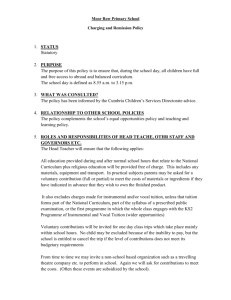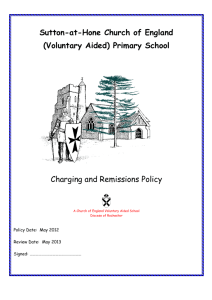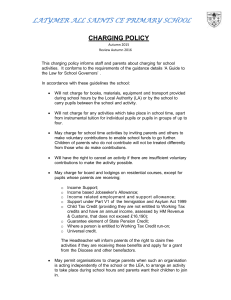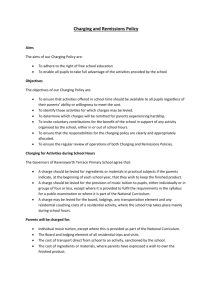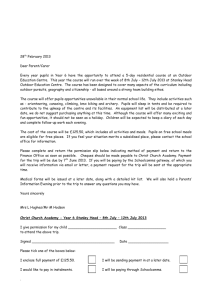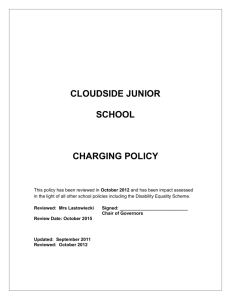MODEL restrictive physical intervention policy for schools
advertisement
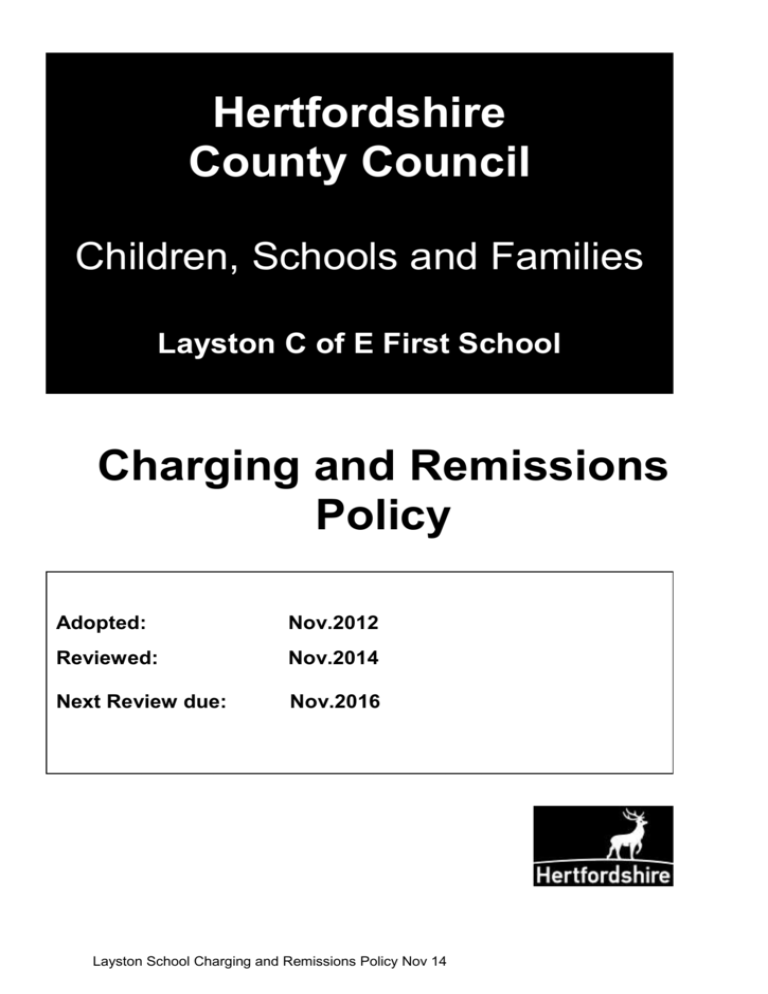
Hertfordshire County Council Hertfordshire Children, Schools and Families Layston C of E First School Charging and Remissions Policy Adopted: Nov.2012 Reviewed: Nov.2014 Next Review due: Nov.2016 Layston School Charging and Remissions Policy Nov 14 Purpose We believe that: All our pupils should have an equal opportunity to benefit from school activities and visits independent of their parents’ financial means. This charging and remissions policy describes how we will do our best to ensure a good range of visits and activities is offered and, at the same time, try to minimise the financial barriers which may prevent some pupils taking full advantage of the opportunities. What was consulted? The policy has been informed by A Guide to the Law for School Governors and the DCSF guidance “Planning and Funding Extended Schools” and “Charging for School Activities” (January 2009). Relationship to other school policies The policy complements the school’s equality policy, curriculum policy, educational visits policy and the teaching and learning policy. Roles and responsibilities of headteacher, other staff, governors The headteacher, staff and governors will ensure that the following applies: 1. No charges will be made for • education provided during school hours (including the supply of any materials, books, instruments or other equipment) • education provided outside school hours if it is part of the National Curriculum, or part of a syllabus for a prescribed public examination that the pupil is being prepared for at the school, or part of the school’s basic curriculum for religious education • tuition for pupils learning to play musical instruments (or singing) if the tuition is required as part of the National Curriculum, or part of a syllabus for a prescribed public examination that the pupil is being prepared for at the school • education provided on any trip that takes place during school hours • education provided on any trip that takes place outside school hours if it is part of the National Curriculum, or part of a syllabus for a prescribed public examination that the pupil is being prepared for at the school, or part of the school’s basic curriculum for religious education • supply teachers to cover for those teachers who are absent from school accompanying pupils on a residential trip • transport provided in connection with an educational trip. 2. Activities for which charges may be made a) Activities outside school hours Non-residential activities (other than those listed in 1 above) which take place outside school hours, but only if the majority of the time spent on that activity takes place outside school hours (time spent on travel counts in this calculation if the travel itself occurs during school hours). b) Residential activities Board and lodging costs (but only those costs) of residential trips deemed to take place during school time. However, pupils whose parents are in receipt of certain benefits (see point 3 below) may not be charged for board and lodging costs. Residential trips deemed to take place outside school time (other than for those activities listed in 1 above). Layston School Charging and Remissions Policy Nov 14 Is a residential trip in or out of school time? If the number of school sessions on a residential trip is equal to or greater than 50 percent of the number of half days spent on the trip it is deemed to have taken place during school hours (even if some activities take place late in the evening). Whatever the starting and finishing times of the school day, regulations require that the school day is divided into two sessions. A “half day” means any period of 12 hours ending with noon or midnight on any day. When any trip is arranged parents will be notified of the policy for allocating places. c) Music tuition Music tuition for individuals or groups of up to four pupils. The following is a form of words that could help to explain to parents and carers what may/may not be charged for. Charges will (or may) be made as indicated below. Parental agreement will be obtained before a charge is made. Activities which can be charged for (with the exception of board and lodging for residential trips) are regarded as “optional extras”. Charges will not exceed the actual cost (per pupil) of provision Activity or thing which will or may be charged for Notes Charges will/may be made for any materials, books, instruments, or equipment, where a parent wishes their child to own them Charges will/may be made for music tuition For example, a clay model – a charge to cover the cost of the clay. Charges will be made for the board and lodging component of residential trips [Add further categories if desired] The cost, or a proportion of the costs, for teaching staff employed to provide tuition in playing a musical instrument or singing, where the tuition is an optional extra for an individual pupil or groups of up to four pupils The charge will not exceed the actual cost Remitted or help available [enter your school decision here] Remission for category A (see below) 3. Families qualifying for remission or help with charges In order to remove financial barriers from disadvantaged pupils, the governing body has agreed that some activities and visits where charges can legally be made will be offered at no charge or a reduced charge to parents in particular circumstances. This remissions policy sets out the circumstances in which charges will be waived. If remission or help is available in relation to a particular charge it is indicated in the right hand column of the table above. Criteria for qualification for remission are given below. Category A Parents in receipt of • Income Support Layston School Charging and Remissions Policy Nov 14 • Income-based Jobseekers Allowance • Income-related Employment Support Allowance • Child Tax Credit, (providing you're not also entitled to Working Tax Credit and have an annual gross income of no more than £16,190) • Pension Credit (Guarantee Credit) • Support under part VI of the Immigration and Asylum Act 1999 • Working Tax Credit run-on - paid for 4 weeks after you stop qualifying for Working Tax Credit Additional categories of parents may claim help with some costs in some circumstances 4. Additional considerations The governing body recognises its responsibility to ensure that the offer of activities and educational visits does not place an unnecessary burden on family finances. To this end we will try to adhere to the following guidelines: • we have established a system for parents to pay in instalments • when an opportunity for a trip arises at short notice it will be possible to arrange to pay by instalments beyond the date of the trip • we acknowledge that offering opportunities on a “first pay, first served” basis discriminates against pupils from families on lower incomes and we will avoid that method of selection. Arrangements for monitoring and evaluation The Finance and Resources Committee of the governing body will monitor the impact of this policy by receiving on a termly basis a financial report on those activities that resulted in charges being levied, the subsidies awarded (without giving names) and the source of those subsidies. It will seek to evaluate the impact of the school’s extended services on those children most in need of additional support. Voluntary Contributions There will be occasions where the school wishes to undertake an activity, which we strongly believe contributes to the pupils’ development, but which unfortunately the school budget is unable to provide for. On these occasions parents/carers will be asked to make a non-refundable voluntary contribution to cover the cost of the activity. No child will miss an activity because their parent does not make a voluntary contribution, but should insufficient contributions be received from parents/carers, the school may need to cancel future additional activities. Layston School Charging and Remissions Policy Nov 14
